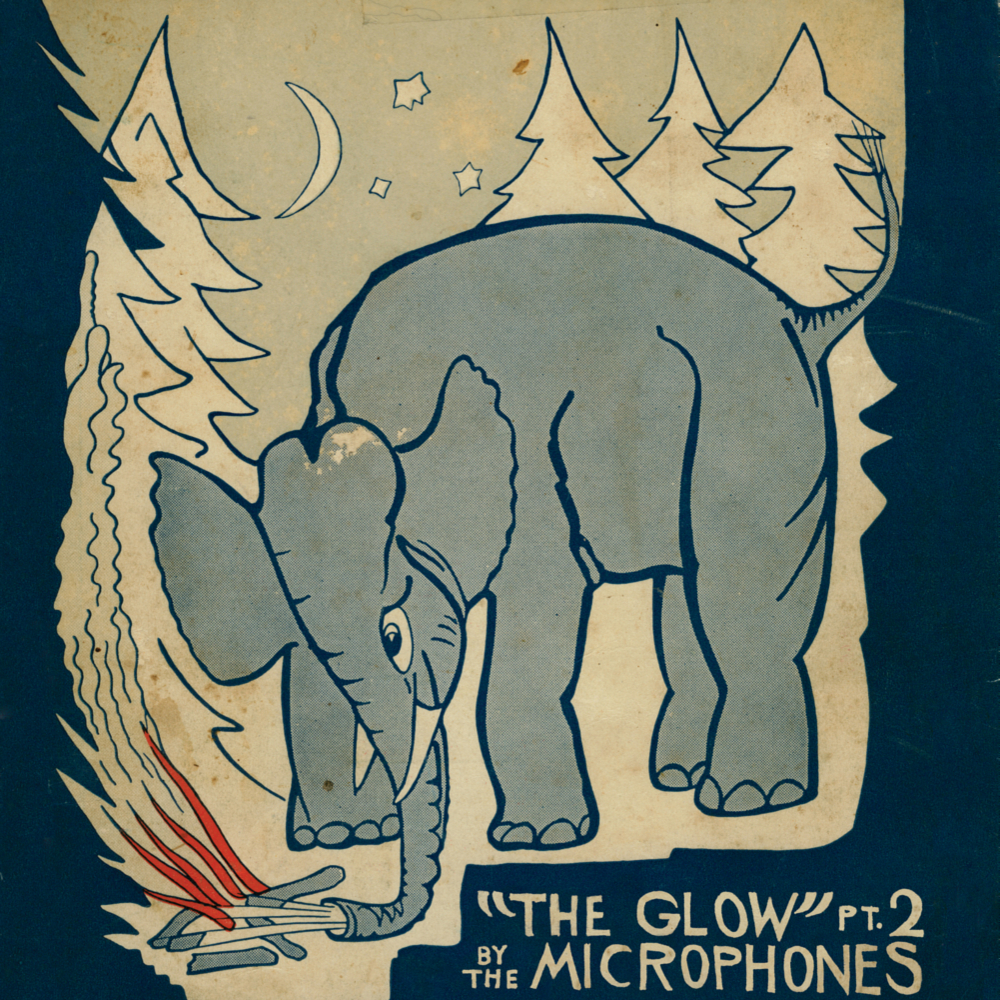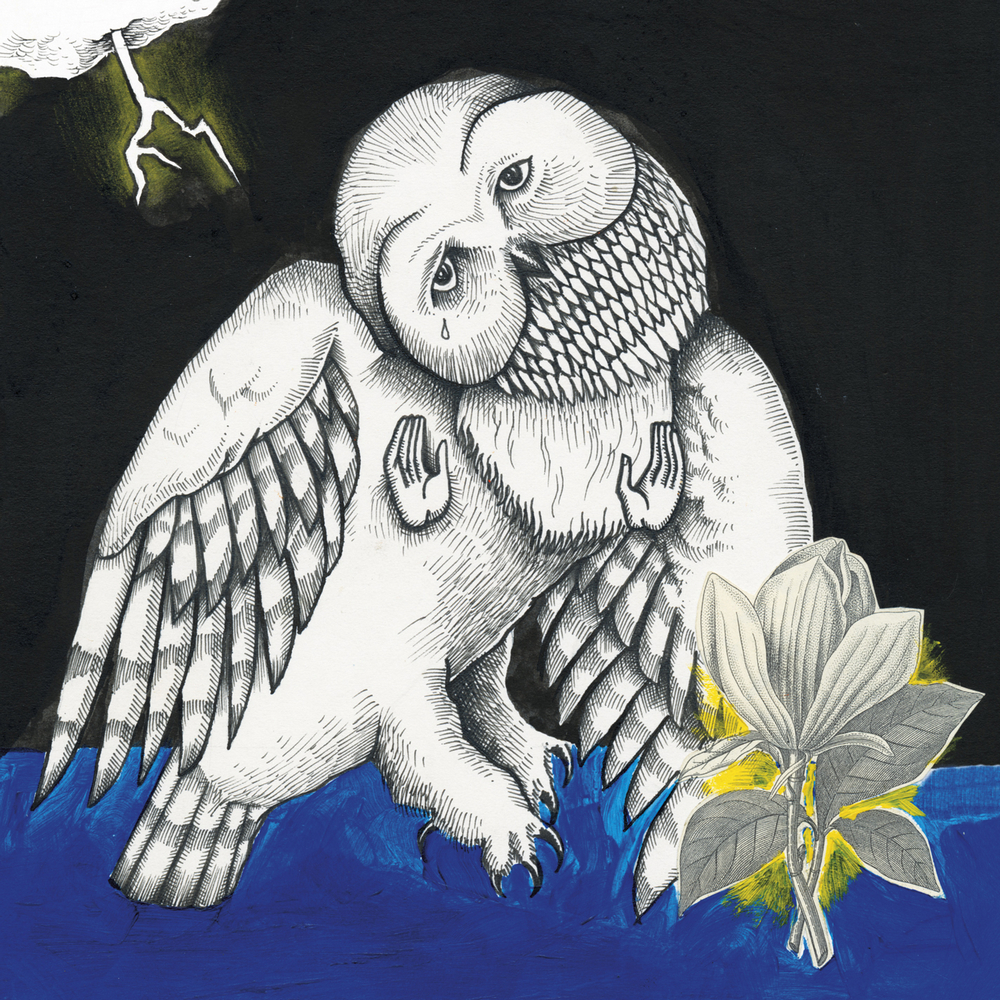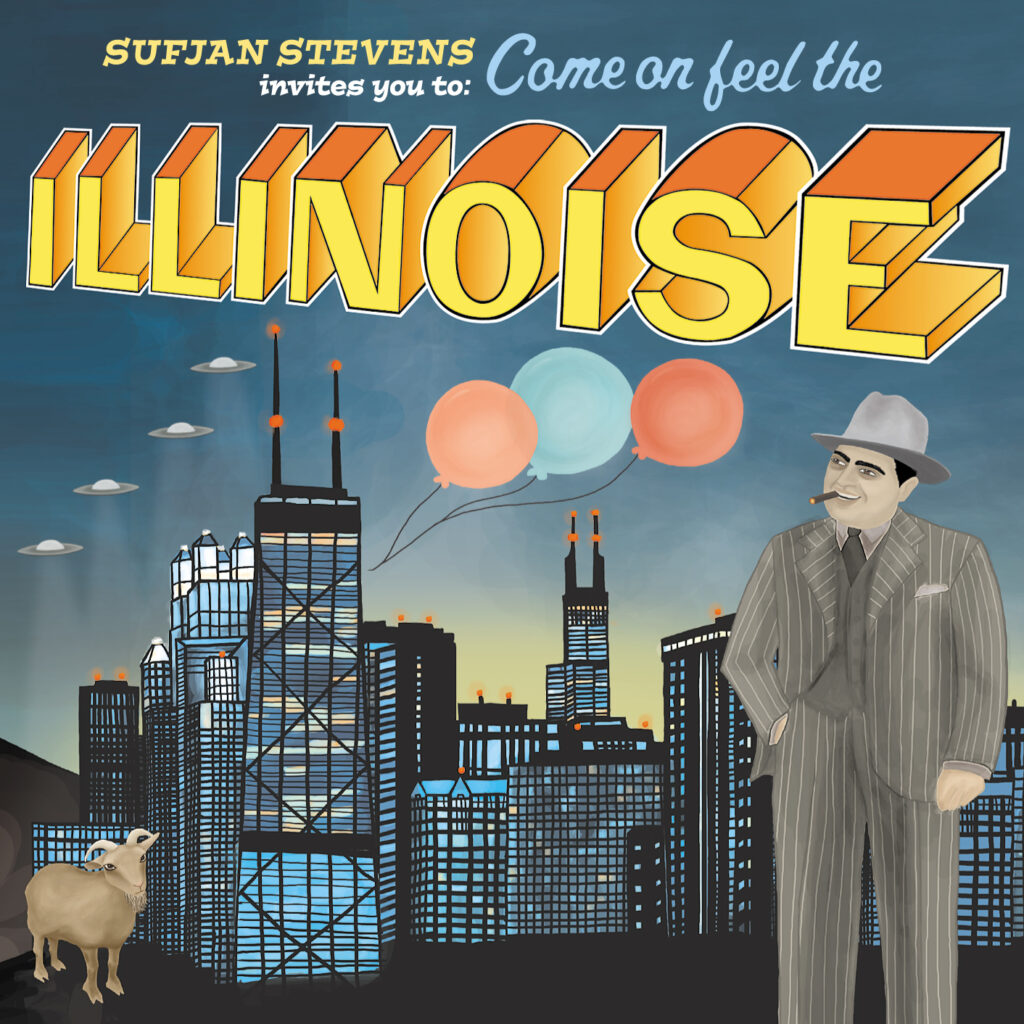The Microphones, ‘The Glow, Pt.2’, 2001

And we went all the way up to the small town where I’m from
With foggy air and the wind and the mountain tops
And we clung to rocks and we looked off
You held my hand, you almost got to start feeling me
I finally felt like I was breathing free
And under swaying trees, we fell asleep and had the same dream
The stars were bright, we dream the same every night
On my island home I spent some time with you
The Glow, Pt. 2 is ostensibly a concept album birthed from Phil Elverum’s personal experiences, particularly focusing on the turbulent feelings during and after a challenging breakup. Unlike typical narrative-driven concept albums, this project weaves its thematic exploration through less direct means—favoring abstract, symbolic representation over straightforward storytelling. Elverum’s penchant for blending the minute details of personal life with grandiose natural imagery creates a profound sensory and emotional experience. The title track, The Glow Pt. 2, depicts a cathartic confrontation with mortality and identity, encapsulated in a poignant articulation: “I faced death. I went in with my arms swinging. But I heard my own breath and had to face that I’m still living”. This confrontation forms the emotional core of the album, as Elverum navigates the profound melancholy of lost connection and the inevitability of moving forward. Headless Horseman utilizes narrative storytelling to describe feelings of alienation and identity crisis and I Am Bored candidly addresses the monotony and aimlessness that often accompany emotional upheaval. Elverum’s lyrical approach was pivotal in defining the character of The Glow, Pt. 2. The lyrics are delivered in a stream-of-consciousness style that feels both intimate and expansive, capturing the raw essence of human vulnerability while elevating the emotional weight through metaphoric and sometimes cryptic lines. Meanwhile, the album skillfully juxtaposes human emotions against the vast and awe-inspiring canvas of the natural world. For instance, I Want Wind to Blow speaks to the desire for clarity and the cleansing power of nature, a recurring image throughout the album.
The Glow Pt. 2 draws from a diverse palette, including black metal, ambient sounds, and avant-garde elements, layered over a foundation of indie rock and folk. The album’s variety is notable, with songs ranging from minimalist acoustic folk concerns to expansive, multi-tracked arrangements that resonate with the force of nature itself. This complexity is evident in tracks like The Moon, where multi-tracked acoustic guitars and floating horns create an evolving soundscape that reflects Elverum’s keen sense of musical arrangement. Elverum recorded the album using analog equipment at Dub Narcotic studios, embracing the imperfections of analog recording to infuse the album with a living, breathing sonic character. The integration of differing technical setups—from using an Otari 8-track machine to a 16-track MCI—contributed to the album’s unique texture. The nuances of the recording processes, including mechanical errors and environmental factors, were deliberately maintained, adding layers of mystery and authenticity to the sound. Elverum’s approach to production eschewed precision for exploration and discovery, embracing sonic imperfections as an aesthetic choice—a decision that mirrors the unpredictable nature of the album.
Songs: Ohia, ‘The Magnolia Electric Co.,’ 2003

The Magnolia Electric Co. marked the transition of Jason Molina’s musical journey from Songs: Ohia to the inception of Molina’s subsequent band, Magnolia Electric Co, which retains the stylistic direction of the album of the same name. This album served as a bridge between two distinct phases of Molina’s career and his magnum opus, a record that encapsulates the melancholic beauty and complexity of his artistic vision. The Magnolia Electric Co. is not structured as a concept album per se, but it inherently possesses a thematic cohesion that gives it a sense of narrative continuity. Molina’s work often features recurring motifs that depict a life of struggle and resilience. The Magnolia weaves a tapestry of darkness, melancholy, endurance, and redemption, threading a narrative deeply enmeshed with both lamentation and faint hope.
Central to the album’s thematic core is the exploration of blue-collar struggles and the decay of industrial America. Songs like Farewell Transmission and Almost Was Good Enough encapsulate these elements with haunting imagery and introspective lyrics. Meanwhile, within I’ve Been Riding with the Ghost, there is a crystal-clear expression of forward momentum: “While you’ve been busy crying about my past mistakes, I’ve been busy tryin’ to make a change,” which encapsulates a relentless pursuit to unshackle from the shackles of past failures. Additionally, the celestial imagery and the concept of journeys pervade tracks such as I’ve Been Riding with the Ghost and Hold On Magnolia, where every journey represents both physical movement and an emotional quest. Songs like John Henry Split My Heart employ metaphors and historical references to further enrich the listening experience, showcasing Molina’s ability to transform personal anguish into art that speaks to broader human experiences.
As Songs: Ohia’s final album, the composition of The Magnolia Electric Co. represents a departure from Molina’s earlier sparse, folk-infused work into a richer, more robust sound landscape. With the inclusion of pedal steel guitar and lush harmonies, this evolution reflects a fusion of alt-country, roots rock, and Americana, integrating elements of 70s country rock and gospel aesthetics. The album’s opener Farewell Transmission epitomizes this transformation, where driving guitar riffs and expansive arrangements generate a profound sense of motion and urgency. The album is imbued with influences from roots rock and outlaw country, with arrangements echoing the likes of Neil Young’s seminal Harvest album. Molina’s collaboration with various artists further enriches the album’s soundscape. Notably, Lawrence Peters and Scout Niblett contribute vocals that contrast yet complement Molina’s introspective style, especially in tracks like The Old Black Hen and Peoria Lunch Box Blues. Meanwhile, the incorporation of female backing vocals adds an ethereal quality to tracks such as I’ve Been Riding with the Ghost, further accentuating the melodic and thematic contrasts within the album.
Sufjan Stevens, ‘Illinois,’ 2005

I cried myself to sleep last night
And the ghost of Carl, he approached my window
I was hypnotized, I was asked to improvise
On the attitude, the regret
Of a thousand centuries of deathEven with the heart of terror and the superstitious wearer
I am riding all alone, I am writing all alone
Even in my best condition, counting all the superstition
I am riding all alone, I am running all alone
Sufjan Stevens’ 2005 album, Illinois, is a landmark in modern indie-folk music and my favorite album of the genre. Subtitled “Sufjan Stevens Invites You to: Come on Feel the Illinois,” it is a concept album that explores various cultural, historical, and geographical elements related to the state of Illinois. However, beyond its state-specific references, the album functions as a historical survey and a movie soundtrack without a film, sprawling in scope and rich in references. Stevens masterfully integrates motifs of American identity, faith, life, death, and personal introspection throughout the album, using Illinois as the lens through which to view broader existential themes.
From the haunting narrative of John Wayne Gacy, Jr. to the joyous celebration in Chicago, Stevens employs his recognizable storytelling approach to great effect. The album’s track titles are often lengthy and descriptive, setting the stage for the stories that unfold within each song. In Come On! Feel the Illinoise!, Stevens uses a whimsical and surreal approach, combining events like the World’s Columbian Exposition of 1893 with personal musings, thereby melding the personal with the historical in a profound way. This conceptual approach enables the album to balance between factual settings and the spiritual themes that Stevens frequently explores, insisting on a portrait of Illinois that is as diverse in sound as it is in subject matter. Stevens’ Christian faith is evident in several tracks, with allusions to biblical narratives and themes of spiritual questioning. Songs like Casimir Pulaski Day grapple with themes of loss and faith, challenging the listener to ponder God’s role in human suffering. This blend of personal and regional history is what elevates the narrative journey within Illinois, making it both a tribute to a place and a profound commentary on the human condition. The album doesn’t shy away from darkness, instead juxtaposing it with vivacious and often intricate imagery that speaks to both the optimism and critique of American life.
Illinois presents a lush tapestry of sounds that range from chamber pop to folk-infused orchestration. Stevens is known for his multilayered compositions, playing most instruments himself, including the acoustic guitar, piano, banjo, and a variety of unconventional instruments like the Wurlitzer, glockenspiel, and accordion. His compositions are complex, with fluctuating time signatures and a meticulous arrangement that highlights his skill in crafting evocative sonic landscapes. On tracks such as Chicago, Stevens utilizes anthemic, layered arrangements that evoke a sense of grandeur, while songs like John Wayne Gacy Jr. strip down to eerie, intimate acoustic settings that enhance the storytelling’s emotional impact. The production of Illinois is marked by Stevens’ unique approach to music-making. Recorded primarily in a small studio in Astoria, Queens, Stevens produced the album himself, layering each track with attention to detail. Illinois offers listeners more than just an auditory journey through the Prairie State—it invites them into a multifaceted exploration of the American soul. The album’s influence extends beyond music, as evidenced by its adaptation into a Broadway musical, Illinois, which opened in 2024. The theatrical adaptation underlines the album’s enduring resonance and its capacity to transcend musical boundaries.
Andrew Jackson, all I’m asking
Show us the wheel and give us the wine
Raise the banner, Jackson hammer
Everyone goes to the capitol line
Colored preacher, nice to meet you
The spirit is here and the spirit is fine
Education, ask the nation
You gave us our sight and the hearing is fine
Andrew Jackson, all I’m asking
Show us the wheel and give us the wine